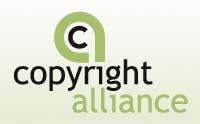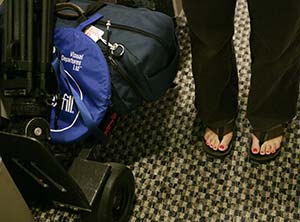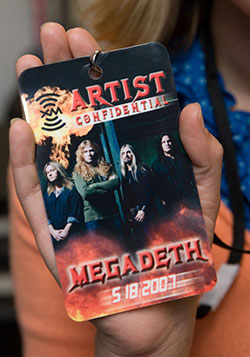 We see ourselves as the good guys, the Rebel Alliance if you will. In the beginning, as with Lucas' fictional rag-tag group who "realized the Empire had absolutely no regard to the rights, or even the lives, of its citizens...", and to Peter Jackson's interpretation of a petite and unwilling leader who fought against "dark forces gathering to the west...", both legions, in the end, won.
We see ourselves as the good guys, the Rebel Alliance if you will. In the beginning, as with Lucas' fictional rag-tag group who "realized the Empire had absolutely no regard to the rights, or even the lives, of its citizens...", and to Peter Jackson's interpretation of a petite and unwilling leader who fought against "dark forces gathering to the west...", both legions, in the end, won.
Enter The Copyright Alliance, a better organized and financed group of organizations with the single aim of resisting the attempts to overthrow the constitutionally endowed rights for creators to possess, for a limited period of time, a monopoly of their creations. Those dark forces are the populus who runs fast and loose with people's rights.
At their announcement of the formalization, Thursday May 17th, James Gibson, University of Richmond Law Professor, cited the example of the many of us who exceed the speed limit. When we do, we break the law, and as with that, when we are caught, we pay the price, he posited. Many infringers, like speeders, see only the infringement as risky if caught, and then, without registration, there is no true punishment, as the recoverable is almost always severely limited, and so, speeders and infringers prevail. So much so, that people seen driving only the speed limit are looked at as antiquated - the grannies of the road - caught in a time warp of reality, where speeding, and, analagously, infringing, is just de rigueur.
Most people who have driven through Georgia, for example, know that you drive 55mph, not 56. Those Georgia troopers enforce the speed limit to the letter. In New York City, everyone knows, "don't block the box", and drive long enough in your own community, you know where the speed traps are. So too, should potential infringers respect the laws - and rights - of those who are the creators.
The Copyright Alliance is working to ensure creators rights are protected. But the Dark Forces to the West are growing, establishing a front, and seeking organizations to chip away at the methodoligies used to protect the artist's right to restrict uses of their works. They have sought to push forward broad-reaching Orphan Works legislation. Many agree that some well thought out version of Orphan Works will be the solution to the critical preservation needs of archivists looking to save images and movies that are being lost to the degradation that occurs over time. That photos that are found in a shoebox at a garage sale might have limited commercial value or intention to commercially be exploited. Yet, blanket protections afforded across the board are what's on the table, and that's just not fair.
Consider that copyright is afforded the citizenry in the first 1,600 words of the Constitution. Consider then, that issues like gun rights, slavery, and equal rights for women were things that were missing and needed to be fixed. The framers considered copyright so important that it was integral to the initial document, yet other important issues were forgotten. Try, instead, dismissing copyright as irrelevant, suggesting that slavery or equal rights for women, are irrelevant. Those dismissals, as with copyright, also are offensive to me.
Among those penning articles about the group are Variety, CNET, Reuters, and Broadcasting & Cable.
You must fight for your rights as a creative. Stand up and be counted. Engage in the dialog and debate. Recognize too, that, where you're reading this not as a US citizen, but rather, around the world, that the world is watching. How we treat copyright can become cracks in the copyright of your own countries.
Please post your comments by clicking the link below. If you've got questions, please pose them in our
Photo Business Forum Flickr Group Discussion Threads.
[More: Full Post and Comments]
 One of your responsibilities as a photographer is to ensure that your photo "reads" well. That means no distracting elements in the background. If you're working for a corporate client, you want your client's logo in the background where it won't be cropped out, but not so much that it looks too commercial.
One of your responsibilities as a photographer is to ensure that your photo "reads" well. That means no distracting elements in the background. If you're working for a corporate client, you want your client's logo in the background where it won't be cropped out, but not so much that it looks too commercial. Today, I made a big decision, one that is the reverse of the culmination of my goals from 15 years ago.
Today, I made a big decision, one that is the reverse of the culmination of my goals from 15 years ago. I learned
I learned  So, you think that the New York Times organization pays just $250 an assignment? Yes, if you don't ask, and press, and convince them you're worth more.
So, you think that the New York Times organization pays just $250 an assignment? Yes, if you don't ask, and press, and convince them you're worth more. Today's Speedlinks are interesting. Once I had someone who wanted to work for me, commuting via train and metro for 90 minutes each way, each day. I talked them out of it because, considering the time, and cost to travel to me and home, their net hourly income was less than minimum wage. Link 2 is all about stock agencies who take public domain images, scan and retouch them, and add metadata, and then claim a copyright registration as a database contribution, or to the metadata. Not a very substantive basis, and built on a house of cards in my opinion.
Today's Speedlinks are interesting. Once I had someone who wanted to work for me, commuting via train and metro for 90 minutes each way, each day. I talked them out of it because, considering the time, and cost to travel to me and home, their net hourly income was less than minimum wage. Link 2 is all about stock agencies who take public domain images, scan and retouch them, and add metadata, and then claim a copyright registration as a database contribution, or to the metadata. Not a very substantive basis, and built on a house of cards in my opinion. We have a strict policy in our office, and it's "no flip flops". We also encourage a business casual environment, yet the importance of maintaining a prepared status in the event a last minute assignment comes up. However, at no time, is it acceptable to wear flip-flops on an assignment (or in the office), even if that assignment is at the beach.
We have a strict policy in our office, and it's "no flip flops". We also encourage a business casual environment, yet the importance of maintaining a prepared status in the event a last minute assignment comes up. However, at no time, is it acceptable to wear flip-flops on an assignment (or in the office), even if that assignment is at the beach. Considering decorum, there are a number of stories that go along with this, try
Considering decorum, there are a number of stories that go along with this, try  So, a couple of days ago I found myself in a somewhat unusual place (for me), in a studio listening to a Megadeth concert and interview. I was somewhat familiar with Dave Mustane, and was duly impressed with his business accumen.
So, a couple of days ago I found myself in a somewhat unusual place (for me), in a studio listening to a Megadeth concert and interview. I was somewhat familiar with Dave Mustane, and was duly impressed with his business accumen. We see ourselves as the good guys, the
We see ourselves as the good guys, the  Honestly, ask yourself - how long do you think it would take for you to review assignment images, and delete outtakes? Assume, for a moment, you are shooting RAW, on a Canon 1Ds Mark II, and you are generating 19MB files. That's 53 images. How long would it take for you to do the delete? A few minutes? With 300GB drives costing around $150 or so, that's about $0.50 per GB, or $1 per GB, properly redundant. It's cheaper to not delete the files, and simply give them a ZERO star rating in your archives. The time involved in either paying someone, or the loss of your own time doing so, just is not worth it. Someday, you may be, for whatever reason, wanting those files. If your camera is generating smaller RAW files, then it will take even longer.
Honestly, ask yourself - how long do you think it would take for you to review assignment images, and delete outtakes? Assume, for a moment, you are shooting RAW, on a Canon 1Ds Mark II, and you are generating 19MB files. That's 53 images. How long would it take for you to do the delete? A few minutes? With 300GB drives costing around $150 or so, that's about $0.50 per GB, or $1 per GB, properly redundant. It's cheaper to not delete the files, and simply give them a ZERO star rating in your archives. The time involved in either paying someone, or the loss of your own time doing so, just is not worth it. Someday, you may be, for whatever reason, wanting those files. If your camera is generating smaller RAW files, then it will take even longer. Over at
Over at 